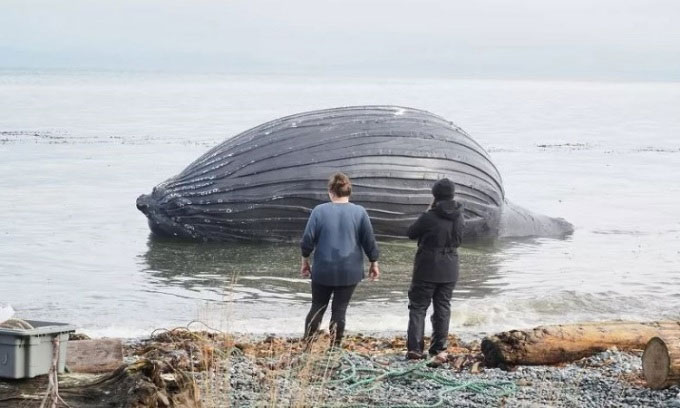Rescue teams have found the carcass of a female humpback whale named Spike washed up on the northern shore of Malcolm Island in British Columbia.
The young humpback whale, Spike, showed no obvious external injuries, and the rescue team has yet to determine the cause of her death. The bloating of Spike’s body is completely normal, according to Jackie Hildering, a humpback whale researcher and communications director at the Marine Education and Research Society (MERS), which participated in identifying the whale. This is a result of gas produced by the decomposition process inside the animal’s body. Eventually, this gas will escape through some means, and the carcass will deflate. Typically, the deflation process occurs as gas is slowly released through small tears in the whale’s skin.

Spike the whale carcass on Malcolm Island. (Photo: Samuel Salvati/MERS)
On rare occasions, whale skin continues to expand like an overinflated balloon. The gas can stretch the skin to the point of bursting. Such incidents have been documented, including in Taiwan in 2004 when a 60-ton sperm whale exploded on a busy street in Tainan. However, Spike does not appear to be at risk of exploding. Her abdomen and throat have deflated compared to earlier photographs. Once the gas fully escapes, her carcass may begin to sink to the ocean floor.
“We have secured Spike’s carcass on the beach to conduct an examination to determine the cause of death. Similar to human autopsies, experts will examine the carcass and internal organs for clues, including body condition, evidence of injuries, stomach samples, and signs of disease, parasites, or various syndromes,” Hildering stated.
It is challenging to estimate how many whales die in British Columbia each year as their carcasses often sink into the sea. The coastline of British Columbia is so extensive that even when whales wash ashore, their bodies may not be discovered early enough to ascertain the cause of death before decomposition sets in. Preliminary research from MERS and the Department of Fisheries and Oceans Canada indicates that about half of the humpback whales off the coast of British Columbia show signs of entanglement. Some also bear scars from ship propellers.
Nevertheless, the population of humpback whales has been increasing in recent decades, which also raises the risk of human encounters. “Humpback whales are threatened by the risk of collisions with vessels, entanglement in fishing gear, and various marine debris, changes in food sources, and noise. They do not have the biological sonar that toothed whales possess,” Hildering remarked.


















































